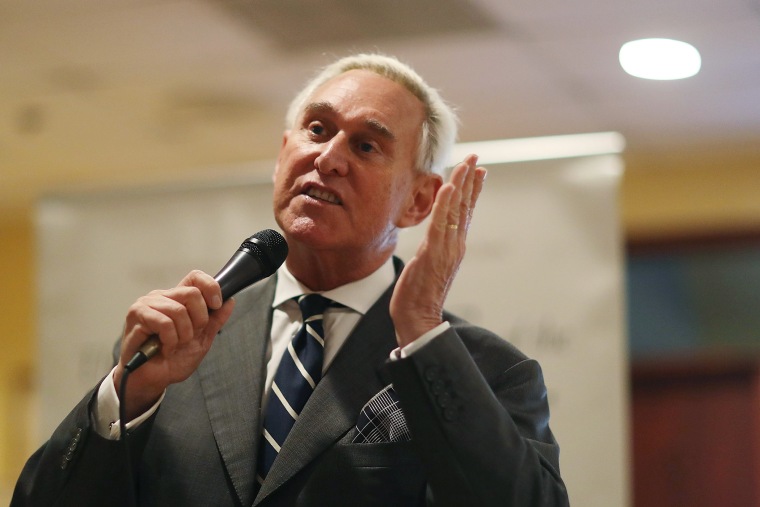During the 2016 presidential campaign, Roger Stone, a longtime Republican operative and informal adviser to Donald Trump, seemed to have unique insights into developments that had not yet occurred. Stone, for example, on more than one occasion, teased anti-Clinton revelations from Wikleaks and its founder, Julian Assange, before the public saw them.
As the Russia scandal intensified, Stone backed off those claims, insisting that his insights were speculative and that he hadn't actually been in communications with Assange. The Washington Post reports today that there's reason to question the veracity of those denials.
[Stone told someone over the phone in the spring of 2016 that] he had learned from WikiLeaks founder Julian Assange that his organization had obtained emails that would torment senior Democrats such as John Podesta, then campaign chairman for Democratic presidential candidate Hillary Clinton.The conversation occurred before it was publicly known that hackers had obtained the emails of Podesta and of the Democratic National Committee, documents that WikiLeaks released in late July and October. The U.S. intelligence community later concluded the hackers were working for Russia.
The Post has two sources. One is Sam Numberg, a former Trump aide, who told the newspaper on the record that he heard from Stone directly about the contacts with Assange. Just as importantly, Numberg said he conveyed all of this to Special Counsel Robert Mueller's team.
The Post's second source is someone the paper has not identified by name.
Stone stands by his denial, though it's worth noting that when the GOP operative testified before the House Intelligence Committee in the fall, he reportedly did not directly answer questions under oath about his suspected Assange contacts.
Why should you care? I think New York's Jon Chait highlighted the relevant context:
The Post's story does not speculate about whether Stone shared his knowledge with other Trump campaign officials, including Donald Trump himself. It would be stunning and bizarre if he did not. Stone held an official role in the Trump campaign, but departed his official role in August 2015 on what he later called "excellent terms." Later in August, Stone was characteristically cagey about his contacts with the candidate. "Asked if he had spoken with Mr. Trump since they apparently went their separate ways, Mr. Stone said: 'I would rather not say. I still consider him a friend, and think he still considers me a friend; let's just leave it at that,'" reported the New York Times.
For those willing to speculate about such things, connecting the dots is a fairly straightforward exercise. Russia stole Democratic materials and directed them to Wikileaks for dissemination in order to help Trump's campaign. Roger Stone, a Trump ally and adviser, is accused of communicating with Wikileaks, getting advance warnings about the pending release of Democratic documents.
If that's true -- and again, this hasn't been proven definitively -- it's possible that Stone, who claims he had regular contacts with Trump during the presidential race, may have also given his buddy a heads-up about the materials from Russia, perhaps around the time top members of Trump's team met with Russians offering anti-Clinton dirt.
Watch this space.
